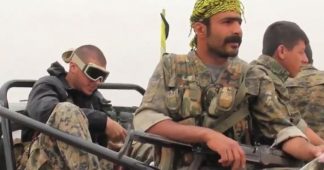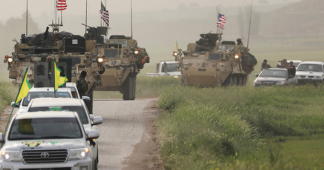The Syrian War is Ending and Assad is the Victor
A message came through from Syria on my mobile phone last week. “General Khadour kept his promise,” it read. I knew what it meant.
Five years ago, I met Mohamed Khadour, who was commanding a few Syrian soldiers in a small suburb of Aleppo, under fire from Islamist fighters in the east of the city. At the time, he showed me his map. He’d recapture these streets in 11 days, he said.
And then in July this year, I met Khadour again, far out in the east of the Syrian desert. He was, he said, going to enter the besieged city of Deir ez-Zor before the end of August. I reminded him, a trifle cruelly, that the last time he told me he’d recapture part of Aleppo in 11 days, it took the Syrian army more than four years to retake. That was long ago, he said. In those days, the army had not learned to fight in a guerrilla war. The army were trained to retake Golan and defend Damascus. But they had learned now.
Indeed they had. Out in the desert, Khadour said he was going to bomb the town of Sukhna – the Russians would do much of the bombing – and his Syrian troops would break through from there to Deir ez-Zor, which had been surrounded by Isis for three years with its encircled 80,000 civilians and 10,000 soldiers. Khadour said he’d reach Deir ez-Zor by 23 August. He turned out to be almost dead on target. Now he is heading towards the rest of Deir ez-Zor and then towards the Syrian-Iraqi border.
So it seems – after the capture of the city is complete and when Khadour is on the frontier, and now that Aleppo is totally in the hands of the regime and only Idlib province remains a dustbin of largely Islamist rebels (including al-Qaeda), many of whom were allowed to travel there in return for surrendering bits of Syrian cities – that what has always been unthinkable in the West is now happening: Bashar al-Assad’s forces look to be winning the war.
And not just “look like”. Hassan “Tiger” Saleh, Syria’s favourite army officer – referred to twice by the Russian defence minister – broke his way into the compound of the 137th Syrian army brigade at Deir ez-Zor and relieved the soldiers there, while Khadour, his commanding officer (they are personal friends), is set to liberate the airbase in the city.
How many remember the day when the Americans bombed the Syrian soldiers close to that airbase and killed more than 60 of them, allowing Isis to cut it off from the rest of the city? The Syrians have never believed the American claim that they made a “mistake”. It was only the Russians who told the US air force they were bombing Syrian forces.
The Brits already seem to have got the message. They slyly withdrew their military trainers last week – the men intended to prepare David Cameron’s mythical “70,000 rebels” who were supposedly going to overthrow the Assad government. Even the UN’s report that the regime killed more than 80 civilians in a gas attack this summer got little play from the European politicians who used to play up war crimes in Syria and supported Donald Trump’s pointless Cruise missile attack on a Syrian airbase.
And what of Israel? Here is a nation which truly counted on the end of Assad, going so far as to bomb his forces and those of his Hezbollah and Iranian allies while giving medical help to Islamist fighters from Syria in Israeli cities. No wonder Benjamin Netanyahu was so “agitated” and “emotional” – Russian descriptions – when he met Vladimir Putin in Sochi. Iran was Russia’s “strategic ally” in the region, Putin said. Israel was an “important partner” of Russia. Which was not quite the same – and not what Netanyahu wanted to hear.
The repeated victories of the Syrians mean that the Syrian army is among the most “battle-hardened” in the region, its soldiers used to fighting for their lives and now trained in coordinating troops and intelligence from a single command headquarters. As former St Antony’s College associate scholar Sharmine Narwani put it this week, this alliance now has political cover from two permanent UN Security Council members, Russia and China.
So what will Israel do? Netanyahu has been so obsessed with Iran’s nuclear programme that he clearly never imagined – in company with Obama, Hillary Clinton, Trump, Cameron, May, Hollande and other members of the political elites in the West – that Assad might win, and that a more powerful Iraqi army might also emerge from the rubble of Mosul.
Netanyahu still supports the Kurds, but neither Syria nor Turkey nor Iran nor Iraq have any interest in supporting Kurdish national aspirations – despite the military use by America of Kurdish militiamen in the so-called Syrian Democratic Forces (it being largely Kurdish rather than “Syrian”, not “democratic” at all and scarcely a “force” without US air power).
So while we’re all waiting for Donald Trump and Kim Jong-un to start World War Three, we’ve not spotted that the military map of the Middle East has substantially, bloodily changed. It will be years before Syria and Iraq (and Yemen) are rebuilt, but the Israelis, so used to calling on Washington for help, may have to go back to Putin again to clear up the mess they’re in.
Those in the Israeli political right who claimed that Assad was a greater danger than Isis may have to think again – not least because Assad may be the man they’ll have to talk to if they want to keep their northern border safe.











